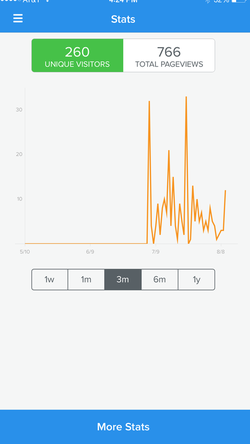| I believe there are two types of people in this world, pessimistic and optimistic. I am an optimist. I think this is why I am still in my profession and loving every second I have with my students. I do think I can make a difference. I am a reflective person. Davis and Lindsay, would say I have excellent intrapersonal skills. It makes me an overachiever. I want to be perfect in an imperfect world. This is a part of my character. Something I do not have control over. My inquiry question is as imperfect as I am. How do you teach middle school students to become responsible citizens with technology in the classroom using character education? When doing my research I came to find out that there are many programs for character education. It is a hot topic issue today in education. While I found many interesting articles on the pros and cons of character education in the classroom. The most evidence I found had statistics and theorists that opposed character education. Advocates of character education admittedly only had qualitative information versus quantitative. How can your prove that character education works? There will always be children from different backgrounds and life situations that create who they are as a person. After reflecting, I do believe many of my character traits are innate yet, exposure to positive role models fostered the most positive attributes inside me. I consider myself an expert on the age group in which I teach. I have been teaching middle school students for 14 years. I still believe at the core that it is a necessity that we teach some type of character education alongside with technology. Qualitative information does have its benefits. I think a teacher’s observations are more important than statistics. My optimistic personality persuades me to believe that it is a necessity to provide character education in the classroom because it does work. I am not a famous theorist, but I am in the classroom on a daily basis. As a teacher, you should never assume anything when it comes to what you think a child should know. I look at every student as a blank canvas. I do believe if I bring in things that matter to them, they will be engaged. As a constructivist, I believe in the teachings of Piaget. Students learn from doing. If I utilize technology in the classroom in an authentic way, I know my students will learn digital responsibility. As a social studies teacher it is quite doable. I even have a plan everyday of what we will be doing with technology. Flattening Classrooms, Engaging Minds: Move to Global Collaboration One Step at a Time will now be my bible. It has so many resources to utilize in participating in authentic projects that teach children to be responsible, professional, reliable, and respectful using Web 2.0 tools. Although not explicitly stated the authors in Flattening Classrooms discuss the necessity of creating responsible, respectful, and honest digital citizens through a digital citizen curriculum. The characteristics that are necessary to be good digital citizens are things that we need to teach our students starting at an early age. Should it be taught at home to be responsible, respectful, and honest? Absolutely! As educators we should not assume anything. We need to educate children through some type of character program whether it is to teach them something they never learned or simply reinforce what they learned from home. The weebly site I found to have the greatest connection with was Rosaria Norkus. Rosaria Norkus’ Inquiry Question: How can technology be used in the seventh grade classroom to expose global and cultural perspectives, foster an understanding and respect for others, and develop an appreciation for diversity? Is symbiotic with teaching digital citizenship because in order for students to learn respect they need to appreciate diversity on a global level. Rosaria’s quote in her blog was insightful in the connection between digital responsibility and building character education. Matt Cone (2014), a global studies teacher in North Carolina, explains the benefits of using technology to explore global issues in “Engaging in Global Issues in the Classroom and Beyond.” The benefits of teaching about global issues through the use of technology often extend beyond the classroom because students are interested and they want to engage in challenging discussions about the material they are learning. This critical thinking also arouses students’ sense of justice. According to Cone (2014), “In my experience, when students feel morally stirred by an issue and want to impact it, they are willing to go to tremendous lengths to understand the issue in all of its complexity” (Cone). What I learned about myself and technology through this course. I thought I was very adept with technology, I was wrong. Many things have changed and I have not kept up with it as much as I thought. When I had a problem in the classroom with technology, I had the help of the tech person. I am not so fortunate this summer. I have struggled with Twitter, setting up a blog, hyperlinks versus URL links, inserting videos, RSS feeds, and the list goes on. In the end, I know it is okay. I cannot give up, I will persevere! This is a teachable moment for my students this year. I will be more empathetic. My take away from working with various technologies is that is very exciting. I was 100% in when I finally figured out what I was doing. I started everything early because I knew I would struggle. My twitter experience has been a great success! I am being retweeted by other educators and experts in the field. I received many direct messages. It is an amazing feeling to connect with people who are like-minded! My Weebly page has had over 741 views year to date. I cannot believe that many people are interested in what I have to say. I know that in talking with many different teenagers throughout the summer ranging from 9th grade to college, Twitter is not a platform they use that often. What they use now is Instagram. I started an Instagram account and did find it to be more interesting than Twitter. I think I will use Instagram with my students in class, Twitter for my own professional purposes the majority of the time, and continue to blog. Bulach, C. R. (2000). Do moral citizens have character? A presentation to The Association for Moral Education at Glasgow, Scotland, on 7-10-2000. Davis, V., & Lindsay, J. (2013). Flattening Classrooms, Engaging Minds: Move to Global Collaboration One Step at a Time (Pearson Resources for 21st Century Learning) 1st Edition. Retrieved July 28, 2015. |


 RSS Feed
RSS Feed